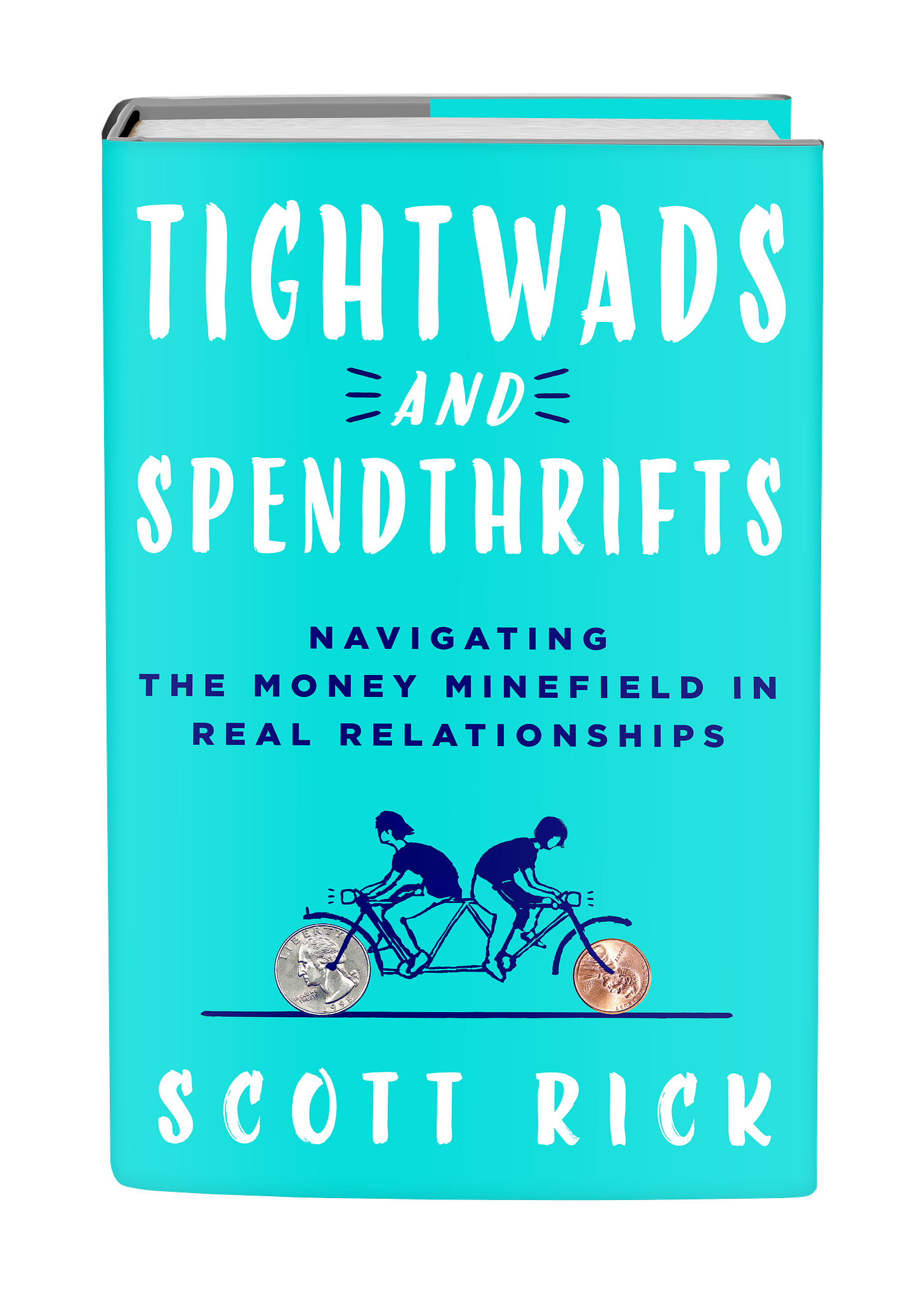How to Navigate the Money Minefield of Relationships
A Q&A with author of Tightwads and Spendthrifts
Money is one of the most persistent and destructive things people fight about in relationships. Unfortunately, there’s a lot of crappy, non-science-based advice out there on how to manage it. So, I was hugely excited to discover Tightwads and Spendthrifts: Navigating the Money Minefield in Real Relationships, by Scott Rick, and to be lucky enough to ask this expert the questions that regularly come up in the couples therapy room.
Scott Rick is an associate professor of Marketing at the University of Michigan’s Ross School of Business. And he’s a spendthrift who knows how to capitalize on his strengths and manage his weaknesses. He shares the science and his advice with me in below (the conversation is edited/condensed for clarity).
(Paid subscribers can enter the April book giveaway for a chance to win a copy of this book. Scroll to the bottom of this email for the link to enter. And congrats to Megan for winning March’s book giveaway—a free copy of Charles Duhigg’s Supercommunicators)
Let me know what pieces of research-backed wisdom on navigating the minefield of money and relationships were most valuable for you? What additional advice has been useful in your navigation of the relationship money minefield?
Yael Schonbrun: As I read your book, I read some passage aloud and my spouse and I laughed about how much our relationship with other around money has evolved. We might think about styles of how we deal with money and how we deal with our partner around money as being quite static, but there can be a real evolution in marital life over time around finances!
Scott Rick: Yes, and particularly in healthier relationships there will be movement over time. If you start off very different places and stay put, that's a recipe for a very tumultuous marriage—or a brief one or unsatisfying one.
Movement can mean you're learning from each other or that you are stumbling into a new role. For instance, if I am a tightwad but I am doing most of the shopping for the family and I'm constantly forced to spend money day after day. It's like exposure therapy. I think about it like a baseball pitcher. You throw enough pitches and your arm warms up and it's less painful.
Yael Schonbrun: That makes me think of a personal marriage story. So, I’m a lady with very curly hair. When I first got married, my straight-haired husband was so confused—why I was spending so much money on hair products? He came into our marriage cold, having no idea what it was like to share a bank account with somebody with long, curly hair!
Ok, moving on and backing up, I want to pick apart your title: Tightwads and Spendthrifts. Can define each of these terms for us?
Scott Rick: People fall along a continuum, but we call the extremes “tightwads” and “spendthrifts.” Tightwads are people who often look good on paper. If you saw their bank accounts, you might not think they would be worried about spending money. But they tend to have anxiety about spending and not buy things that they should. They're worried about the future and going broke. And that's a very frustrating experience for them.
Then there's the spendthrifts. To use another metaphor, it's like somebody cut the brake lines with spendthrifts. The tightwads are always driving around with the emergency brake on. For the spendthrift, there isn’t enough distress. We're very present-oriented and not thinking or caring enough about future consequences. We end up buying a lot of things that we know that we don't really need or that we're going to tired of soon. And that, too, can be kind of frustrating.
So even though tightwads and spendthrifts spend very differently, they can both end up being unhappy with their usage of money.
Yael Schonbrun: They're kind of on the extreme ends of spending. A healthier, more satisfying place would be in the middle, with unconflicted spending. Is that right?
Scott Rick: Exactly. That's the goldilocks zone. They don't get a fun name, these unconflicted consumers. But in general, you do want emotions to pull the future into the present and you want something holding you back. Not too little, not too much, just the right amount.
Yael Schonbrun: The subtitle of the book is “Navigating the Money Minefield in Real Relationships.” We know from research that finances are one of the top things that people argue about and it certainly brings people in for couples’ therapy. There's a lot of complexity, but could you summarize some of the main reasons why money causes so much conflict between partners?
Scott Rick: First of all, there are so many explicitly financial decisions that you have to confront as a couple. And there are decisions about how we spend our time, what hobbies are the kids going to engage in. Questions like:
Where are we going to vacation?
What should we do about my mom?
Should we try to help her move to our city or keep her somewhere else?
So many things we have to confront are financial decisions. There's no hiding from it, so it's a relentless thing we have to face.
And there's often different incomes. Even spouses who work in the same field will often earn different incomes and there's lots of reasons why spouses’ incomes differ and that can produce a lot of tension.
And part of it is we feel differently about how money should be used. This is the tightwad-spendthrift problem.
Yael Schonbrun: On the face of it, finances are very practical matter. But they also symbolize so much in terms of what we value, how we want to live our lives, how we express love, and so on.
Scott Rick: Yes, that's part of the reason why I have a chapter on gift-giving. Because we're not as open as we should be about how we feel and what we know about our partners. And so, for better or worse, a lot of us let the gifts do the talking. And we can often spend money on things that convey the wrong message.
Yael Schonbrun: I really appreciated that advice because it’s one of the love languages that Gary Chapman talks about (there is some limited science supporting “love languages). There is lots of misleading guidance about how we should be buying gifts that you dig into the research to correct.
Scott Rick: Yes, one of the popular pieces of advice that's out there is to avoid disaster by asking your partner what they want. The rationale is to avoid very, very bad outcomes. My wife's parents had an issue where her dad got her mom a vacuum or iron for some anniversary or something. That's a nice thing to have in the house, but it's not a gift..
Yael Schonbrun: Do you remember the movie, Father of the Bride? The fiancé gifted a blender and it almost got the wedding cancelled.
Scott Rick: Yes, you want to avoid that outcome, so you just ask. But the problem is that gift-giving occasions are these rare moments where we really have a chance to express what we know about our partner and how much we care about them. If you just get what they asked for, you can't convey this crucial information. We want to be known and seen by our partners and this is a way to demonstrate that.
Giving a good gift is about understanding your partner’s inner psychological world. What are they curious about? What are they interested in? Do they have exciting plans or hopes? You’ve got to learn about them and that takes time. You can't do it the day before. You have to explore their inner world and that's hard to do on a day-to-day basis when you're just talking about, who's going let the plumber in.
Yael Schonbrun: Right, it's about putting meaning behind the money.
Let me transition to asking about a perennial question of whether birds of a feather flock together when it comes to financial styles or whether opposites attract. Your research offers some answers.
Scott Rick: Well, there are many cases where we go out and we marry someone very much like ourselves, where Republicans marry Republicans and Democrats marry Democrats. But if there's something that we are self-conscious about or don't love in ourselves and we see it reflected in someone else, it can really shine an uncomfortable spotlight on the issue by bringing up bad feelings about ourselves. That's the case for tightwads and spendthrifts—they don't love that part of themselves.
We think that at first it is kind of fun to be with someone who goes about spending money differently than you do in particular. You can imagine the tightwad being fascinated and amused by the spendthrift with their easygoing spending behavior. It's new, it's interesting, and it’s fun to be in their presence. And we do find that tightwads and spendthrifts are more likely to marry each other than they are to marry someone like themselves. But that gets tricky over time.
In dating, the decisions are often less consequential. You can put up with little quirks and foibles because there aren't high stakes. But when you start making decisions about where to live and other things that leave a mark for years to come, what was once kind of fun and interesting can really start to get kind of irritating and unacceptable.
I think there's huge potential for happiness, but it can be tricky to navigate.
Yael Schonbrun: You offer advice to navigate it better and I want to dig into one particular piece about joint versus separate accounts and which fosters better relationship satisfaction. Can you talk us through some of the research you and your colleagues have done?
Scott Rick: Sure. We did an experiment with people who were engaged or newlyweds who had separate accounts and were undecided about what to do in their marriage. We paid them to either keep their accounts separate, to merge their money into a joint bank account or to just do whatever they want. Then we followed them for two years, checking in to assess their satisfaction and measures of relationship quality.
What we found was that people we prompted to take the leap and merge their money into a joint account maintained their initial high level of relationship satisfaction more than couples in the other conditions. In a causal way, we found that adopting joint accounts can be good for couples who are open to it. Of course, we only had so many couples and couldn’t not test every possible account structure. And I do think all joint is better than all separate, but I don't think only joint is the way to go.
I love a combination of joint and separate, and using joint upfront for receiving all incoming money. Joint accounts upfront is a way to psychologically launder the money. All incoming money is ours immediately.
But then on the backend we can take some of our money and bring it into a separate account that only one of us can use. We can each spend some money without close monitoring by the other person while maintaining a high-level understanding of what the other person. We refrain from checking line-by-line details that might drive us nuts. Like the expenditures on hair products or a hobby that is important to you. Once you really get into something and you have expertise in a hobby or craft, the prices are going to seem astronomical to a rookie.
And then you have people convinced that if you could just stop buying lattes, you could afford like the house of your dreams. Partners argue or nitpick little purchases because they've heard this advice.
A nice way for tightwads and spendthrifts to co-exist is to limit active discussion to big household level things, but not the nitty gritty of what everyone's up to.
Yael Schonbrun: It’s this middle ground between full transparency and a lot of secretiveness.
Scott Rick: Yes, a room of our own is a good thing to have. It’s like if my partner has a diary. The diary is not secret to me, but I'm not rifling through it. It's a secret that I know and that offers autonomy and individuality, even in a very committed relationship. You can lose autonomy if you're just spending to avoid the criticism or constantly second-guessing your partner. That's why I say you need financial translucency where you get an impression of what your partner's up to, but the details are just available upon request. And hopefully we can limit those requests.
Yael Schonbrun: Before we end our conversation, I wanted ask about your recommendations for how to co-parent when there's one tightwad and one spendthrift.
Scott Rick: There can be tons of disagreements and certainly a child can inflame a spendthrift to new heights. I've experienced this myself!
My rule of thumb is that if the disagreement is about a material purchase, tend towards letting the tightwad win. Avoid the purchase or make them more conservative because we know from happiness research that you don't get a lot of bang for your buck from most material purchases. Of course, some material purchases are good and help everyone, like a new furnace, but a lot of material things just don't deliver happiness in the long run like we hope they will. So let the tightwad win those disagreements.
Whereas if we're talking about an experience, particularly a shared family experience, tend towards letting the spendthrift win those because it’s so essential for bonding and learning about each other and the anticipation and the storytelling, the memories afterwards. These are really times, if you can at all afford it, to go all out. So there I advise letting the spendthrifts win those disagreements.
Yael Schonbrun: Ok, so whose preferences should be prioritized differs based on what kind of an expenditure it is, material or experiential.
As we end, I wanted to share that I loved the lesson you learned through writing the book about how you'd like to approach your own spendthriftiness going forward. Would you be willing to share that here?
Scott Rick: Yeah, in some ways the book strangely made me a little more of a spendthrift. The whole book was a reminder about the fragility of life. I'm writing it while my kids are growing up so fast before my eyes. So it's prompted me to be more deliberate in trying to seize the day and collect experiences and do novel things that might be expensive. But I'm also trying to have some tightwad operations in the background, like automatic saving and making sure there's some money I can't touch.
Yael Schonbrun: I love that. Spendthrifts will be happy to hear it.
Scott Rick: I love them.
Me, too, Scott, me too.
So, what money and love insights, ideas, or strategies from Scott stood out as being particularly interesting or helpful to you?
If you enjoyed this conversation about having conversations, check out the book in its entirety (link below) or, for paid subscribers, make sure to enter in to the April book giveaway!







* the exact title of my parent’s marriage 😂
My husband and I had SO many arguments about money in our early years. In fact, every argument seemed to end up there eventually. We finally hit upon the suggested solution, having one joint account, and each getting our own “allowance” in a separate account. This allowed me to spend as much money as I wanted on my own expensive curly hair (to be fair, I think it was more that I was defensive about it than that he was judgemental about it). The tension this removed was incredible, to the point that now we just use the joint account, and my husband has never once asked me if I actually *need* 10 different hair products.